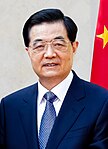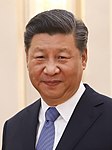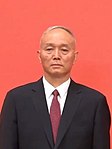 | |
| Information | |
|---|---|
| General Secretary | Xi Jinping |
| First-ranked secretary | Cai Qi |
| Members | |
| Elected by | Central Committee |
| Responsible to | Politburo and its Standing Committee |
| Seats | 7 |
| Meeting place | |
| Qinzheng Hall, Zhongnanhai Beijing, China | |
| Central Secretariat of the Chinese Communist Party | |||||||
|---|---|---|---|---|---|---|---|
| Simplified Chinese | 中国共产党中央书记处 | ||||||
| Traditional Chinese | 中國共產黨中央書記處 | ||||||
| Literal meaning | China Communist Party Central Secretariat | ||||||
| |||||||
| Alternative Chinese name | |||||||
| Simplified Chinese | 书记处 | ||||||
| Literal meaning | Secretariat | ||||||
| |||||||
The Secretariat, officially the Secretariat of the Central Committee of the Communist Party of China, is a body serving the Chinese Communist Party (CCP)'s Politburo and Standing Committee. The secretariat is mainly responsible for carrying out routine operations of the Politburo and coordinating organizations and stakeholders to achieve tasks set out by the Politburo. It is empowered by the Politburo to make routine day-to-day decisions on issues of concern in accordance with the decisions of the Politburo, but it must consult the Politburo on substantive matters.
The secretariat was established in January 1934. It is nominally headed by the CCP general secretary, though the position of head of the secretariat was not always the same as the top party leader. Secretaries of the secretariat (Shujichu Shuji) are considered some of the most important political positions in the CCP and contemporary China, more generally. Each secretariat secretary is generally in charge of one of the major party departments directly under the jurisdiction of the Central Committee. By protocol, its members are ranked above the vice chairmen of the National People's Congress as well as State Councilors. The general secretary presides over the secretariat's work.
History
The Secretariat of the Central Committee was formed on 15–18 January 1934 at the 5th Plenary Session of the 6th Central Committee, which was held in Shanghai. On 20 March 1943, the Politburo, in a joint decision, decreed that the secretariat will be responsible for carrying out the work of the Politburo according to the general policy framework determined by the Politburo and that it is vested with the power to make decisions within this general framework.
A formal head of the secretariat for managing its affairs has existed several times. Ren Bishi was elected Secretary-General of the Chinese Communist Party by the 6th Poliburo in August 1941. It existed until a meeting of the 7th Politburo on 20 March 1943, which abolished the post and replaced it with the new office of Chairman of the Secretariat, with Mao Zedong being elected to the post. The 1st Plenary Session of the 7th Central Committee elected Ren Bishi as Secretary-General of the Central Committee and Li Fuchun as Deputy Secretary-General of the Central Committee on 11 June 1945. It is unclear who took over Ren Bishi's office upon his death on 27 October 1950.
On 27 April 1954, the 8th Politburo decided to establish the offices of Secretary-General of the Central Committee and Deputy Secretary-General of the Central Committee. Deng Xiaoping was elected as secretary-general and Li Fuchun, Yang Shangkun, Tan Zhenlin, Ma Mingfang, Song Renqiong, Liu Lantao, Lin Feng, Li Xuefeng and Hu Qiaomu as deputy secretaries-general. This institution was not called Secretariat, but rather the "Conference of the Secretary-General". The 8th National Congress in 1956 abolished it and formally replaced it with the Secretariat. The 1st Plenary Session of the 8th Central Committee opted to re-elect Deng Xiaoping as secretary-general with no deputy on 28 September 1956.
In May 1966, the 8th Politburo convened to criticize the mistakes of leading cadres, including that of Deng Xiaoping. He was replaced, and the office of the secretary-general was abolished, and Tao Zhu was elected as Standing Secretary. It is unclear when this office stopped functioning, and the Secretariat more generally, but the 9th National Congress in 1969 decided to abolish these institutions.
The office was re-established in 1978 when Chen Yun, a member of the 11th Politburo Standing Committee, proposed to the 11th Politburo to re-establish both the Secretariat and the offices of secretary-general and deputy secretary-general. That politburo meeting re-established elected Hu Yaobang as secretary-general and Hu Qiaomu and Yao Yilin as deputy secretaries-general, but did not re-establish the Secretariat. This occurred at the 5th Plenary Session of the 11th Central Committee on 23–29 February 1980, but this plenum also decided to abolish the offices of deputy secretary-general. The position was abolished alongside the office of Chairman of the Chinese Communist Party at the 12th National Congress in 1982, and replaced with the office of General Secretary of the Chinese Communist Party.
Functions
The Secretariat is the working body of the CCP Politburo and Politburo Standing Committee. The CCP General Secretary presides over the work of the Secretariat. The members of the Secretariat are nominated by the Politburo Standing Committee and approved during a plenary session of the CCP Central Committee. The secretaries of the Secretariat are tasked with coordinating the dissemination and implementation of Politburo and PSC decisions. They also assist in reviewing political reports, creating policy plans and help in personnel decisions.
First secretary
The first secretary is the de facto head of the Secretariat, who is responsible for the management of directives and day-to-day work of the Secretariat assisting the general secretary. A member of both the Politburo Standing Committee and the Secretariat, the officeholder is considered one of the most powerful figures in China's political system.
The two most recent general secretaries, Hu Jintao and Xi Jinping, were first elevated to the position of first secretary of the Secretariat in the same process used to determine the membership and roles of the Politburo Standing Committee.
| No. | Portrait | Name | Took office | Left office | Duration | Electoral term | BY | PM | Birthplace |
|---|---|---|---|---|---|---|---|---|---|
| General Secretary of the Central Committee's Secretariat | |||||||||
| 1 | 
|
Deng Xiaoping | 28 September 1956 | 23 August 1966 | 9 years and 329 days | 8th CC (1956–1969) |
1904 | 1924 | Guang'an, Sichuan |
| Standing Secretary of the Central Committee's Secretariat | |||||||||
| - | 
|
Tao Zhu | 23 May 1966 | 4 January 1967 | 226 days | 8th CC (1956–1969) |
1908 | 1926 | Qiyang, Hunan |
| General Secretary of the Central Committee's Secretariat | |||||||||
| 2 | 
|
Hu Yaobang | 29 February 1980 | 12 September 1982 | 2 years and 196 days | 11th CC (1977–1982) |
1915 | 1933 | Liuyang, Hunan |
| First Secretary of the Central Committee's Secretariat | |||||||||
| 3 | — | Hu Qili | 24 September 1985 | 24 June 1989 | 3 years and 273 days | 12th CC (1982–1987) 13th CC (1987–1992) |
1929 | 1948 | Yulin, Shaanxi |
| 4 | — | Qiao Shi | 24 June 1989 | 19 October 1992 | 3 years and 117 days | 13th CC (1987–1992) |
1924 | 1940 | Shanghai |
| 5 | 
|
Hu Jintao | 19 October 1992 | 15 November 2002 | 10 years and 27 days | 14th CC (1992–1997) 15th CC (1997–2002) |
1942 | 1964 | Taizhou, Jiangsu |
| 6 | 
|
Zeng Qinghong | 15 November 2002 | 22 October 2007 | 4 years and 341 days | 16th CC (2002–2007) |
1939 | 1960 | Ji'an, Jiangxi |
| 7 | 
|
Xi Jinping | 22 October 2007 | 15 November 2012 | 5 years and 24 days | 17th CC (2007–2012) |
1953 | 1974 | Beijing |
| 8 | 
|
Liu Yunshan | 15 November 2012 | 25 October 2017 | 4 years and 344 days | 18th CC (2012–2017) |
1947 | 1971 | Salaqi County, Suiyuan |
| 9 | 
|
Wang Huning | 25 October 2017 | 23 October 2022 | 4 years and 363 days | 19th CC (2017–2022) |
1955 | 1984 | Shanghai |
| 10 | 
|
Cai Qi | 23 October 2022 | Incumbent | 2 years and 75 days | 20th CC (2022– ) |
1955 | 1975 | Youxi County, Fujian |
See also
- General Office of the Chinese Communist Party
- Grand Secretariat (Imperial court of China)
References
- Su, Weimin (30 May 2011). "十一屆三中全會后的中南海" [Zhongnanhai after the Third Plenary Session of the Eleventh Central Committee]. People's Daily (in Chinese). Archived from the original on 13 October 2022. Retrieved 14 August 2019.
- "中共第六届历次中央全会" [The Plenary Sessions of the 6th Central Committee of the Communist Party of China]. People's Daily (in Chinese). Archived from the original on 17 August 2023. Retrieved 17 August 2023.
- ^ Li, Lin (21 September 2012). "中国共产党第七届中央领导机构" [The Organizational History and Functional Changes of the Secretariat of the CPC Central Committee]. People's Daily (in Chinese). Archived from the original on 9 March 2022. Retrieved 17 August 2023.
- "中国共产党第七届中央领导机构" [The 7th Central Leading Organisation of the Communist Party of China] (in Chinese). Communist Party Membership Network. 21 September 2012. Archived from the original on 9 August 2023. Retrieved 6 August 2023.
- "中国共产党第八届中央领导组织" [The 8th Central Leading Organisation of the Communist Party of China] (in Chinese). The Central People's Government of the People's Republic of China. 19 September 2008. Archived from the original on 8 August 2023. Retrieved 6 August 2023.
- "中国共产党十一届五中全会简介" [Introduction to the Fifth Plenary Session of the 11th Central Committee of the Communist Party of China]. People's Daily (in Chinese). Archived from the original on 17 August 2023. Retrieved 17 August 2023.
- "中共第十二届历次中央全会" [The Plenary Sessions of the 12th Central Committee of the Communist Party of China] (in Chinese). The Central People's Government of the People's Republic of China. Archived from the original on 26 July 2023. Retrieved 25 July 2023.
- 中共中央印发《中国共产党中央委员会工作条例》 [The Central Committee of the Communist Party of China issued the "Regulations on Work of the Central Committee of the Communist Party of China"]. State Council of the People's Republic of China (in Chinese). 12 October 2020. Archived from the original on 26 September 2023. Retrieved 27 September 2023.
- "Decoding Chinese Politics: Party Center". Asia Society. Retrieved 11 October 2024.
- "Cai Qi Leads Propaganda Ministers Conference". China Media Project. 2023-01-05.
Following the 20th National Congress of the CCP in October last year, Cai Qi, who previously served as Party Secretary of Beijing, succeeded Wang Huning (王沪宁) as the First Secretary of the CCP Secretariat in charge of propaganda and ideology.
- "The big dance: A look back at the 17th Party Congress". China Briefing News. 2007-10-31.
Xi, the son of liberal party elder and former vice-premier Xi Zhongxun will take over the post of first-ranked secretary of the CCP Secretariat and state vice-president.
- "Politburo Standing Committee: Who are the men who rule China now?". BBC News. 2022-10-23.
Current political ranking: First secretary of the Communist Party's Secretariat
- "Chinese Government Leadership 20th Politburo Standing Committee". US-China Business Council.
Cai Qi is first secretary of the CCP Central Committee Secretariat.
External links
| Secretaries of the Secretariat of the Chinese Communist Party | |
|---|---|
| 8th Secretariat (1956–1969) |
|
| 11th Secretariat (1980–1982) | |
| 12th Secretariat (1982–1987) | |
| 13th Secretariat (1987–1992) | |
| 14th Secretariat (1992–1997) | |
| 15th Secretariat (1997–2002) | |
| 16th Secretariat (2002–2007) | |
| 17th Secretariat (2007–2012) | |
| 18th Secretariat (2012–2017) | |
| 19th Secretariat (2017–2022) | |
| 20th Secretariat (2022–2027) | |
| ||||||||||||||||||||||||||||||||||||||||||||||||||||||||||||||||||||||||||||||||||||||||||||||||||||||||||||||||||||||||||||||||||||||||||||||||||||||||||||||||||||||||||||||||||||||||||||||||||||||||||||||||||||||||||||||||||||||||||||||||||||||||||||||||||||||||||||||||||||||||||||||||||||||||||||||||||||||||||||||||||||||||||||||||||||||||||||||||||||||||||||||||||||||||||||||||||||||||||||||||||||||||||||||||||||||||||||||||||||||||||||||||||||||||||||||||||||||||||||||||||||||||||||||||||||||||||||||||||||||||||||||||||||||||||||||||||||||||||||||
